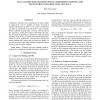Free Online Productivity Tools
i2Speak
i2Symbol
i2OCR
iTex2Img
iWeb2Print
iWeb2Shot
i2Type
iPdf2Split
iPdf2Merge
i2Bopomofo
i2Arabic
i2Style
i2Image
i2PDF
iLatex2Rtf
Sci2ools
ISBI
2009
IEEE
2009
IEEE
Fast Algorithms for Nonconvex Compressive Sensing: MRI Reconstruction from Very Few Data
Compressive sensing is the reconstruction of sparse images or signals from very few samples, by means of solving a tractable optimization problem. In the context of MRI, this can allow reconstruction from many fewer k-space samples, thereby reducing scanning time. Previous work has shown that nonconvex optimization reduces still further the number of samples required for reconstruction, while still being tractable. In this work, we extend recent Fourier-based algorithms for convex optimization to the nonconvex setting, and obtain methods that combine the reconstruction abilities of previous nonconvex approaches with the computational speed of state-of-the-art convex methods.
Fewer K-space Samples | ISBI 2009 | Medical Imaging | State-of-the-art Convex Methods | Tractable Optimization Problem |
| Added | 19 May 2010 |
| Updated | 19 May 2010 |
| Type | Conference |
| Year | 2009 |
| Where | ISBI |
| Authors | Rick Chartrand |
Comments (0)

